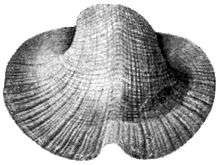Bellerophontoidea
Bellerophontoidea, (Bellerophontaceae Ulrich & Schofield, 1897, ex Bellerophontidae McCoy 1951), common name "bellerophonts",[1] is a superfamily of extinct planospirally-coiled globose molluscs. This superfamily is generally included within the Gastropoda, but may instead be a group of monoplacophorans. The taxon first appeared late in the Cambrian and continued until late in the Triassic.
| Bellerophontoidea | |
|---|---|
 | |
| Bucanopsis leda (family Bellerophontidae, subfamily Bucanopsinae) | |
| Scientific classification | |
| Kingdom: | |
| Phylum: | |
| Class: | |
| (unranked): | |
| Superfamily: | Bellerophontoidea (=Bellerophontaceae) |
| Families | |
|
See text | |
Biology
Unlike normal gastropods, the shells of Bellerophonts are characterised by a completely planispiral pattern of coiling, such as one finds in shelled cephalopods. Experts disagree whether Bellerophontids should be classified as torted gastropods, or as untorted Tergomya, or whether the group Bellerophontida is perhaps an artificial construct, consisting of a number of distinct groups of Palaeozoic molluscs which evolved the same type of spiral shell independently.[3]
J.B. Knight, et al.[4] (1960) regarded the bellerophontids as torted gastropods even though they have essentially symmetrical, planispiral shells.
The narrower apex was probably held to the rear while the wider aperture was oriented to the front where the animal could easily emerge or retreat.
Taxonomy
Historical background
The taxonomy of the Bellerophontoidea (renamed from the original Bellerophontacea) has gone through a number of revisions since M'Coy established the Bellerophontaceae in 1851 for planospiral archeogastropods. The naming followed the convention for superfamilies that prevailed until at least 1992 with Wahlman
The Bellerophontacea were placed in the order Bellerophontida established by Ulrich and Scofield in 1897[5] and included the families Bellerophontidae, Bucaniidae, Cyrtolitidae, and Protowarthiidae.
Knight, et al. 1960 (Treatise Part I reprinted 1989)[6] discuss the Superfamily Bellerophontacea at some length and include within it the Bellerophontidae, Cyrtolitidae, Sinuopeidae and Tropidodiscidae.
2005 Bellerophontid taxonomy
Bouchet et al. (2005)[1] leaves the higher taxonomic position of the Bellerophontoidea as uncertain (Gastropoda or Monoplacophora) and divides the group into 8 families as listed:
- Bellerophontoidea
The Bellerophontidae, Bucanitidae, Pterothacidae, and Tropododiscidae compare with the subfamilies Bellerophontinae, Bucanitinae, Pterothacinae, and Tropododiscinae included in the Bellerophontidae and the Bucanellidae, Euphemitidae, and Sinuitidae compare with the subfamilies Bucanellinae, Euphemitinae, and Sinuitinae included in the Sinuitidae, as found in the Treatise. The Tremanitiae is based on the genus Tremanotus which was included in the Bucanitinae in the Treatise.
Bouchet & Rocroi (2005)[1] points out (page 271) that assignment of "symmetrical univalved mollusks "bellerophonts" either to Gastropoda or to Monoplacophora or Tergomya is controversial."
Note on nomenclature
Until recently with the ruling of the ICZN, -the ending -ACEA, or -ACEAE, was more or less standard for superfamilies in invertebrate paleontology and zoology. The ending -OIDEA which is now used for superfamily names was previously often used for subclasses and superorders.
References
- Bouchet P. & Rocroi J.-P. (Ed.); Frýda J., Hausdorf B., Ponder W., Valdes A. & Warén A. 2005. Classification and nomenclator of gastropod families. Malacologia: International Journal of Malacology, 47(1-2). ConchBooks: Hackenheim, Germany. ISBN 3-925919-72-4. ISSN 0076-2997. 397 pp. http://www.vliz.be/Vmdcdata/imis2/ref.php?refid=78278
- McCoy F. 1852. A synonpsis of the classification of the British Palaeozoic rocks, with a systematic description of the British Palaeozoic fossils in the Geological Museum of the University of Cambridge with figures of the new and imperfectly known species. Parker & Son, London, 661 pp., 25 plates. Bellerophontidae is at page 307.
- Wagner, P. J. 2001 Gastropod phylogenetics: progress, problems and implications. Journal of Paleontology 75: 1128 - 1140
- J.B. Knight, et al. 1960. Treatise on Invertebrate Paleontology, Part I, Mollusca 1; R.C. Moore,(ed); Geological Society of America and Univ Kansas Press.
- Ulrich E. O. & Scofield W. H. 1897. The Lower Silurian Gastropoda of Minnesota. In: Ulrich E. O., Scofield W. H., Clarke J. M. & Winchell N. H. The Geological and Natural History Survey of Minnesota, volume 3(2), Harrison and Smith, Minneapolis, 48 plates. Pages 813-1081, plates 61-82. Bellerophontacea is on page 844.
- Knight, J. B., Cox, L. R., Keen, A. M., Batten, R. L., Yochelson, E. L., and Robertson, R. (1960). Systematic descriptions [Archaeogastropoda]. In Moore, R. C. (ed.) Treatise on Invertebrate Paleontology. Part I. Mollusca 1, pp. 169-310. Geological Society of America and Kansas University Press, Colorado and Kansas.